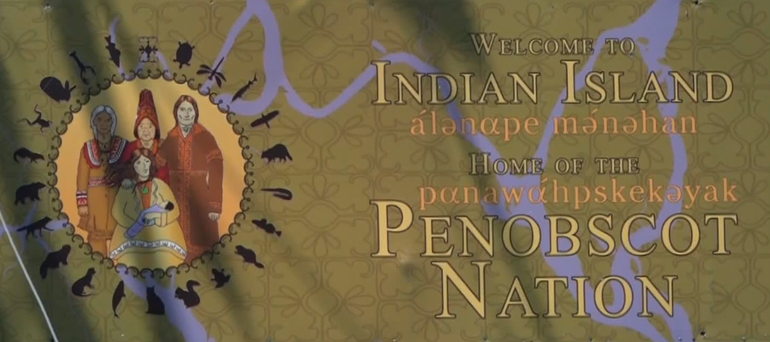
Processing Your Payment
Please do not leave this page until complete. This can take a few moments.
- News
-
Editions
View Digital Editions
Biweekly Issues
- December 1, 2025
- Nov. 17, 2025
- November 03, 2025
- October 20, 2025
- October 6, 2025
- September 22, 2025
- + More
Special Editions
- Lists
- Viewpoints
-
Our Events
Event Info
Award Honorees
- Calendar
- Biz Marketplace
Penobscot Nation officials applaud Cabinet nomination, at a crucial time
 Photo / Video screen image
A sign welcomes visitors to Indian Island, on the Penobscot River in Old Town. The Penobscot Nation, Maine's largest community of indigenous people, is applauding President-elect Joe Biden's nomination of U.S. Rep. Deb Haaland, D-N.M., as secretary of the interior. Haaland is a member of the Pueblo tribe and would be the first Native American to hold a cabinent position if approved by the U.S. Senate.
Photo / Video screen image
A sign welcomes visitors to Indian Island, on the Penobscot River in Old Town. The Penobscot Nation, Maine's largest community of indigenous people, is applauding President-elect Joe Biden's nomination of U.S. Rep. Deb Haaland, D-N.M., as secretary of the interior. Haaland is a member of the Pueblo tribe and would be the first Native American to hold a cabinent position if approved by the U.S. Senate.
The Penobscot Nation is applauding the nomination of U.S. Rep. Deb Haaland, D-N.M., as secretary of the interior, in a crucial time for Maine's four tribes.
Haaland, President-elect Joe Biden's nominee for the post, would head the department that oversees the Bureau of Indian Affairs. She would be the first Native American to serve as a Cabinet secretary if her nomination is approved by the U.S. Senate.
Penobscot Chief Kirk Francis, in a news release, said the choice is a positive one for natural resource and land management throughout the country. “As a tribal citizen, Congresswoman Haaland understands the importance of responsible land management, the importance of the waters that run through those lands, and the importance of managing the resources on those lands for the future of all Americans," Francis said.

The nomination comes at a significant time for Maine's Wabanaki citizens. In June, the state's four tribes announced formation of the Wabanaki Alliance, a coalition that is advocating for tribal sovereignty in the state.
The 129th Legislature had been working on L.D. 2094, which would have made changes to the 1980 Maine Indian Claims Settlement Act, which restricted the ability of the four tribes to govern themselves. The bill died when the Legislature was forced to adjourn early by the COVID-19 pandemic, though there are plans to revive the proposal in the 130th Legislature.
Francis said that Haaland's native New Mexico is similar to Maine in that the state has a long history of trying to balance tourism, natural resource management and respect for its indigenous people. Haaland is a citizen of the Pueblo of Laguna, and New Mexico is the aboriginal territory of 23 Native nations still in existence.
“Haaland’s family and ancestors have been caretakers of New Mexico’s lands, waters and natural resources for thousands of years and she will bring that intergenerational knowledge with her to the job of interior secretary,” Francis said. “President-elect Biden’s choice of Haaland for interior secretary indicates a recognition of the need for balanced responsible management of this nation’s lands, waters and natural resources. It also reflects a commitment to include a diversity of voices and perspectives in an effort to unify the country for our collective future."
Federally sovereign, but under state law
Maine's four tribes — Penobscot, Passmaquoddy, Houlton Band of Maliseet and Aroostook Band of Micmacs — own or control about 170,000 acres in the state. There is Indian reservation land, which is held in trust by the federal government and controlled by the Department of the Interior; fee land, which is land that's owned outright; and trust land, which the department takes into trust for the tribes, but allows them to control themselves.
"Taking land into trust is one of the most important functions U.S. Department of Interior undertakes on behalf of the tribes," the Wabanaki Alliance website says. "Acquisition of land in trust is essential to tribal self-determination. Tribes are sovereign governments and trust lands are a primary locus of tribal authority."
Many federal programs and services are available to tribal citizens only on reservations or trust lands, and reworking the 1980 settlement act would give the state's tribes that control, which they lost in the settlement. The law put the tribes in the position of being sovereign under federal law, yet subject to Maine law — a limbo that is unique among the nation's tribes, and is the main focus of reworking the agreement.
The tribes originally asked for 12.5 million acres, and the settlement act passed by the U.S. Congress instead gave them $81 million, most of it in federally held trust, that allowed them to buy 150,000 acres from large timber corporations.
Haaland's experience in New Mexico is different as far as tribal land control goes. The federal government manages more than a third of the land in New Mexico. One of the most significant rivers in the Southwest, the Rio Grande, flows through New Mexico. There are 12 national monuments, two national historical parks, one national heritage area and one national park within the state.
But environmental issues are the focus in both states. In New Mexico, the state’s riparian areas — the banks of its rivers, streams and wetlands — have been stressed for decades by drought and climate change. The state has a long history of trying to balance tourism, natural resource management and respect for its indigenous peoples, Francis said.
The Penobscot Nation has the most land of the state's native people, more than 4,900 acres of reservation land that includes more than 200 islands in the Penobscot River, and it protects and manages in excess of 90,000 acres of trust land in nine locations across central, western and northern Maine. The Penobscot and Passamaquoddy communities have been at the forefront of clean energy development and natural resource conservation in the state.
Visible representation of Native leaders
Penobscot Nation Ambassador Maulian Dana said that Haaland's nomination is about more than policy. Dana said she feels a deeply personal connection to the nomination as a bright spot in a tumultuous political year. Dana is also president of the Wabanaki Alliance.
“As an indigenous women and mother of two daughters, it makes me feel like there is so much more that is possible for us to achieve because of leaders like Congresswoman Haaland breaking barrier after barrier," she said in the news release.
"Visible representation of our Native leaders assists us in our intergenerational healing," said Dana. "We stand on Congresswoman Haaland’s shoulders as well as all the indigenous women that came before us and were silenced by oppression, racism and colonial violence. Her selection as interior secretary makes me feel like we have more of a voice in the halls of a government that has failed us time and again. It feels empowering and like a new beginning after a dark four years.”
The Wabanaki have about 7,500 citizens, according to the most recent tribal census. In 1606, Maine and eastern Canada's five indigenous nations, which also included the Abenaki, formed the Wabanaki Confederacy, and more than a century later, supported the new Americans in the revolution against Great Britain. The tribes, though, were decimated by centuries of war, disease and mistreatment.
The 1980 settlement was signed with the hope of continuing the improve the relationship between the tribes and the U.S., members of the Wabanaki Alliance said when it formed this year, but that hasn't happened. The members of the new Wabanaki Alliance have said they hope to restore the rights that the nation's 500 other Indian tribes have.
Mainebiz web partners

The Giving Guide
The Giving Guide helps nonprofits have the opportunity to showcase and differentiate their organizations so that businesses better understand how they can contribute to a nonprofit’s mission and work.
Learn More
Work for ME
Work for ME is a workforce development tool to help Maine’s employers target Maine’s emerging workforce. Work for ME highlights each industry, its impact on Maine’s economy, the jobs available to entry-level workers, the training and education needed to get a career started.
Learn More
Groundbreaking Maine
Whether you’re a developer, financer, architect, or industry enthusiast, Groundbreaking Maine is crafted to be your go-to source for valuable insights in Maine’s real estate and construction community.
Learn more-
The Giving Guide
The Giving Guide helps nonprofits have the opportunity to showcase and differentiate their organizations so that businesses better understand how they can contribute to a nonprofit’s mission and work.
-
Work for ME
Work for ME is a workforce development tool to help Maine’s employers target Maine’s emerging workforce. Work for ME highlights each industry, its impact on Maine’s economy, the jobs available to entry-level workers, the training and education needed to get a career started.
-
Groundbreaking Maine
Whether you’re a developer, financer, architect, or industry enthusiast, Groundbreaking Maine is crafted to be your go-to source for valuable insights in Maine’s real estate and construction community.
ABOUT
NEW ENGLAND BUSINESS MEDIA SITES
No articles left
Get access now
In order to use this feature, we need some information from you. You can also login or register for a free account.
By clicking submit you are agreeing to our cookie usage and Privacy Policy
Already have an account? Login
Already have an account? Login
Want to create an account? Register
Get access now
In order to use this feature, we need some information from you. You can also login or register for a free account.
By clicking submit you are agreeing to our cookie usage and Privacy Policy
Already have an account? Login
Already have an account? Login
Want to create an account? Register







0 Comments